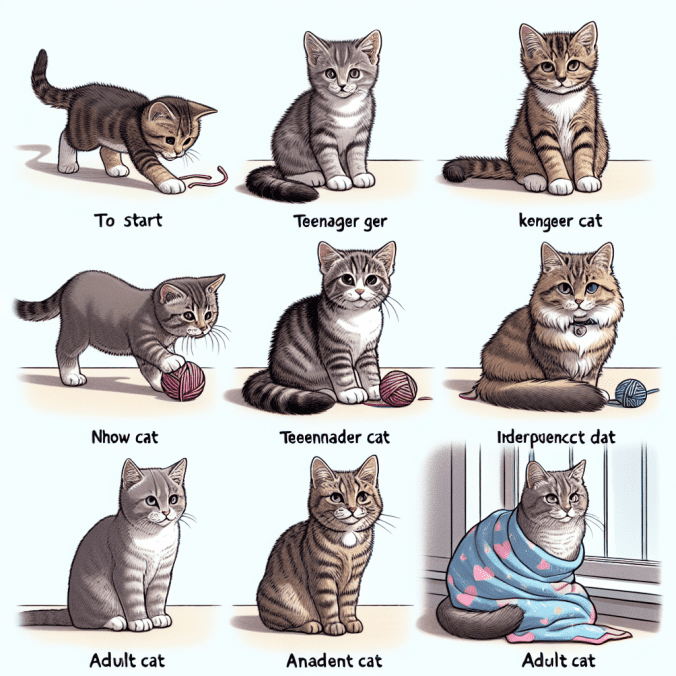The Evolution of a Cat’s Personality: Understanding the Different Temperaments and Traits
Cats have often been described as enigmatic, each with their unique quirks and attributes. If you’ve ever owned a cat, you know how their personalities can range widely—from the aloof and independent to the affectionate and attention-seeking. But how do these personalities develop, and what factors influence them? In this blog, we’ll unravel the mystery behind the evolution of a cat’s personality and delve into the various temperaments and traits that make our feline friends so fascinating.
The Genetic Blueprint
Much like human beings, the personality of a cat starts taking shape even before they are born. Genetics play a substantial role in setting the baseline for a cat’s temperament. The ancestry of a cat, including its breed, has a significant influence on its behavior and characteristics.
- Breed-Specific Traits: Some breeds, like Siamese cats, are known for their vocal and social nature, while others, like the Persian cats, are more laid-back and quiet.
- Inherited Behaviors: Certain traits, such as hunting skills or territoriality, can be passed down from parent cats.
So, if you find your cat oddly obsessed with shadow-hunting or unusually talkative, it might just be rooted in their genetic coding.
Early Socialization: The Formative Weeks
The first few weeks of a kitten’s life are crucial for developing their personality. This period is often referred to as the “socialization window.” During this time, kittens are highly impressionable and learning about their world through interactions with their mother, siblings, and humans.
- Human Interaction: Regular handling by humans can make kittens more sociable and friendly as they grow older.
- Playtime: Play is not just fun; it’s an important way for kittens to learn social cues and develop their hunting instincts.
Inadequate socialization can result in shy or anxious cats, while positive early experiences help in fostering confident and outgoing personalities.
Environment: The Influential Surroundings
The environment in which a cat lives also shapes its personality. A stable and enriching environment contributes to a well-rounded and happy cat, while stressful or chaotic surroundings can lead to behavioral issues.
- Space to Roam: Cats appreciate having room to explore and the ability to retreat to a safe space when needed.
- Mental Stimulation: Interactive toys, climbing trees, and puzzle feeders can keep a cat engaged and stave off boredom.
- Consistency: Cats are creatures of habit and thrive in environments where they can anticipate regular feeding times and interactions with their human companions.
So, if your feline friend is a bit grumpy, take a look around. Maybe it’s time to rearrange the living room or buy that new cat tree you’ve been eyeing.
Individual Experiences: The Unique Personal Journey
Just like humans, cats are shaped by their individual experiences. A cat that has faced trauma or abuse, for instance, may exhibit signs of fear or aggression. Conversely, a pampered, well-loved kitty will likely be more trusting and sociable.
The unique journey of each cat makes them who they are—whether they’re an adventure-seeker scaling the kitchen shelves or a lap-loving purr machine. The key is to respect and nurture their unique qualities.
Common Cat Personalities
While each cat is unique, there are a few common personality types that many cat owners will recognize:
- The Social Butterfly: Always the first to greet visitors and loves being the center of attention.
- The Solitary Snoozer: Prefers alone time and can often be found napping in a quiet spot.
- The Curious Explorer: Adventurous and loves exploring every nook and cranny of the house.
- The Playful Kitten-at-Heart: Always ready for playtime and never seems to outgrow their kitten-like energy.
- The Pensive Philosopher: Prefers to sit back and observe the world, giving them an aura of quiet wisdom.
Recognizing these traits can help in understanding and better caring for your feline friend, ensuring a long-lasting and fulfilling relationship.
Conclusion: Embrace the Feline Enigma
The evolution of a cat’s personality is a fascinating journey influenced by genetics, early socialization, environment, and individual experiences. By understanding these factors, we can better appreciate the unique quirks and traits that make each cat special. So next time your cat gives you that inscrutable look, remember—they’re a complex being shaped by a multitude of influences, each adding to the intricate tapestry of their personality.
And, if all else fails, just know that the age-old theory still stands: cats do indeed believe they are the rulers of your home. So, bow down gracefully, human, and enjoy the loyal companionship of your feline overlord!
